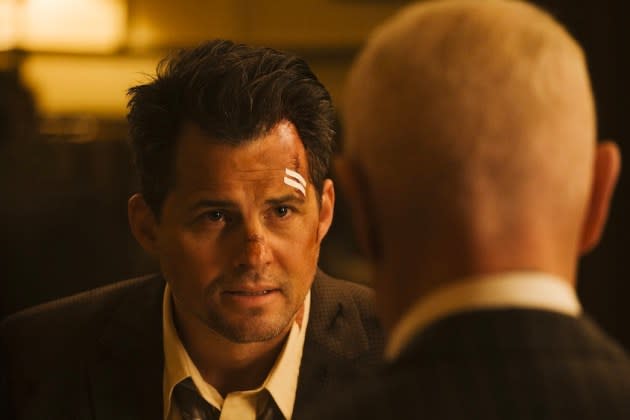‘The Shift’ Review: Amateurish Christian Multiverse Movie Draws Loose Inspiration From the Book of Job

Are multiverses consistent with Christian theology? Personally, I have my doubts, but in Angel Studios’ religious-minded sci-fi thriller “The Shift,” the notion that there could be infinite parallel realities offers an original, if flawed model to test its main character’s faith.
Here’s how it works: A churchgoing man named Kevin (Kristoffer Polaha) meets and marries his dream woman, Molly (Elizabeth Tabish), only to have his happy life whisked away from him by a steely-eyed stranger who calls himself “the Benefactor” (Neal McDonough). Kevin’s desperate to get back to his wife, but this Benefactor guy seems determined to rattle his convictions, trying to force Kevin to reject his beliefs and go along with the rest of society’s atheist attitudes.
More from Variety
That’s where the movie’s other big biblical connection comes in. “The Shift” is billed as a contemporary retelling of the book of Job, in which God tests a man who has everything he could want by stripping him of his family, friends and property, but still the man does not turn his back on his creator. Writer-director Brock Heasley doesn’t approach the film as a direct adaptation, but instead focuses on the underlying lesson so many take from Job: It’s normal to question why a benevolent deity would allow people to suffer, and yet the character serves as an example for remaining steadfast in the face of such trials.
It’s not immediately clear what the multiverse idea has to do with that, apart from offering a dramatic shortcut to deprive Kevin of everything that was going well in his life before. The Benefactor comes across a bit like Morpheus at first (or else a Satanic version of Dean Stockwell’s “Quantum Leap” character), appearing at the site of a terrible car accident, where he explains to Kevin how all those realities work. “Choice breeds infinite possibilities,” the Benefactor explains, with a new universe branching off every time someone makes a decision — sort of a high-concept negation of free will.
The rules are confusing, to say the least, though the important thing for Kevin to understand is that this devilish tour guide can pluck people from one universe and “shift” them to another, effectively banishing them from their old lives. That’s how Kevin winds up stuck in the grimly authoritarian police state where most of the film takes place, a godless slum city patrolled by heavily armed stormtroopers in opaque white visors — a neat design touch that gives the movie a menacing dystopian edge. When they start shooting, however, the film takes a hard turn into amateur territory.
In Kevin restrictive new reality, prayer has been outlawed and scripture is illegal. Heasley’s hero refuses to comply, which makes him an outlaw in a world deprived of religious freedom, while earning the admiration of underground believers, such as Gabriel (Sean Astin), whom he meets at a work site. Kevin’s defiance evokes the plight of early Christians, who were actively persecuted for their beliefs, spooking audiences who feel as if society is cracking down on their freedoms … when in fact the opposite science-fiction scenario seems to be unfolding in America today.
Although it becomes Kevin’s mission to ditch this dimension and go looking for Molly across the multiverse, the film has more in common with “The Handmaid’s Tale” than “Everything Everywhere All at Once,” right down to the former’s green-tinged, peak-television production values. For believers looking to spend their bucks on films that reflect their values, “The Shift” does a serviceable job of offering them another genre to explore. Be warned, however: Heasley’s premise feels like something cooked up by L. Ron Hubbard, not your typical Christian filmmaker.
Heasley first made “The Shift” as a 21-minute short, and there’s just enough here to support a feature. It all would have worked better if audiences bought the relationship between Kevin and Molly, but the two leads lack chemistry or a compelling meet-cute (the one Heasley provides is almost painful). Still, the scene where Kevin drops out of the sky and splashes into a lake makes an impression, while the film’s steampunk finale (too obviously set to Jars of Clay’s “Oh My God”) suggests an evangelical riff on “12 Monkeys,” with the Benefactor serving as an ice-cold stand-in for Satan. McDonough delivers the polar-opposite kind of intensity from Al Pacino in “The Devil’s Advocate,” but it’s his interpretation of evil that will stick with audiences as they return to their respective realities.
Best of Variety
Sign up for Variety’s Newsletter. For the latest news, follow us on Facebook, Twitter, and Instagram.